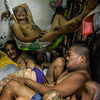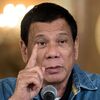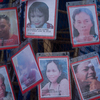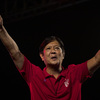
[ad_1]

The headquarters of the International Criminal Court in The Hague, Netherlands
Mike Corder/AP
disguise caption
toggle caption
Mike Corder/AP

The headquarters of the International Criminal Court in The Hague, Netherlands
Mike Corder/AP
MANILA, Philippines — On a brilliant stage in a rented-out highschool auditorium, Amelia Santos grieves brazenly earlier than the viewers.
Clutching a wi-fi microphone, the 55-year-old from Caloocan City, an space in Metro Manila’s north, remembers the day she returned house from work in September 2016 and was instructed her husband, Edward Narvarte, had been killed.
“Somebody went to my house and told me, ‘Go to your husband because he was killed, he was shot a lot of times by the police,'” she says. “When I arrived, there were police… and I saw the dead bodies of the victims, my husband was one of them.”
Her household has not been the identical, Santos tells the viewers. Her kids are scared and depressed and she or he is alone and afraid. Authorities linked her husband to a infamous Philippine drug lord, she says — a connection Santos denies.
With tears streaming down her face and her voice quivering with a mixture of outrage and disappointment, Santos remembers asking God, “Why? Why did this happen to us?”
“I will not stop until justice has been served,” she says.
Santos isn’t alone. Almost the entire almost 20 individuals onstage on this play, titled EJK Teatro, have misplaced a liked one to the Philippine authorities’s so-called battle on medication — launched by former President Rodrigo Duterte in 2016.

Amelia Santos, 55, holds up a portrait of her late husband, Edward Navarte, throughout a current efficiency. Santos says her husband was focused in a 2016 extrajudicial killing by police as a part of the Philippines’ battle on medication.
Ashley Westerman for NPR
disguise caption
toggle caption
Ashley Westerman for NPR

Amelia Santos, 55, holds up a portrait of her late husband, Edward Navarte, throughout a current efficiency. Santos says her husband was focused in a 2016 extrajudicial killing by police as a part of the Philippines’ battle on medication.
Ashley Westerman for NPR

The forged of EJK Teatro poses onstage with Roman Catholic priest Flaviano Villanueva (fifth from left), founding father of Program Paghilom, and European Union Special Representative on Human Rights Eamon Gilmore (middle) following a efficiency.
Ashley Westerman for NPR
disguise caption
toggle caption
Ashley Westerman for NPR

The forged of EJK Teatro poses onstage with Roman Catholic priest Flaviano Villanueva (fifth from left), founding father of Program Paghilom, and European Union Special Representative on Human Rights Eamon Gilmore (middle) following a efficiency.
Ashley Westerman for NPR
EJK stands for extrajudicial killing. The play is a part of the nonprofit Arnold Janssen Kalinga Foundation‘s Program Paghilom, which has been serving to victims’ households since 2016. Performing onstage is a form of cathartic remedy for individuals who need to deliver consideration to vital points within the Philippines. From inflation woes and environmental points to the drug battle and fears of a takeover by China, this eclectic efficiency — an almost hour-long mixture of scripted strains, unscripted monologues and many music and dancing — pulls no punches.
The day NPR attended, human rights campaigners, victims’ members of the family and their supporters have been joined within the viewers by a delegation from the European Union, together with EU Special Representative on Human Rights Eamon Gilmore.
The efficiency comes at a time when the sluggish wheels of justice look like beginning to flip within the drug battle.
Last month, the International Criminal Court denied an appeal by the Philippine authorities for the court docket to droop amassing proof for its investigation into alleged crimes in opposition to humanity dedicated through the seven-year battle on medication.
The denial of this attraction, analysts say, will inevitably deliver authorities officers into the scope of the investigation — placing present President Ferdinand “Bongbong” Marcos Jr. in a tricky bind politically, as his vp is Duterte’s daughter and she or he is a political ally who helped him safe the nation’s prime workplace final May.
The denial got here two months after the ICC declared that the Philippines’ personal investigation into the drug battle — a tactic by Duterte to decelerate the ICC investigation — was not ample and that the court docket would resume the probe it tried to launch in 2021.

A relative holds the hand of Jonathan Sevilla, who was shot lifeless by unknown attackers, at a morgue in Malabon, Metro Manila, Philippines, March 23, 2018.
Ezra Acayan/NurPhoto through Getty Images
disguise caption
toggle caption
Ezra Acayan/NurPhoto through Getty Images

A relative holds the hand of Jonathan Sevilla, who was shot lifeless by unknown attackers, at a morgue in Malabon, Metro Manila, Philippines, March 23, 2018.
Ezra Acayan/NurPhoto through Getty Images

Nanette Castillo grieves subsequent to the lifeless physique of her son Aldrin, an alleged drug person killed by unidentified assailants, in Manila, Oct. 3, 2017.
Noel Celis/AFP through Getty Images
disguise caption
toggle caption
Noel Celis/AFP through Getty Images

Nanette Castillo grieves subsequent to the lifeless physique of her son Aldrin, an alleged drug person killed by unidentified assailants, in Manila, Oct. 3, 2017.
Noel Celis/AFP through Getty Images
Philippine officials say that some 6,200 individuals have died in anti-drug operations since Duterte launched the battle on medication. Human rights teams and the United Nations estimate the quantity could possibly be a lot larger, with most killed by police or vigilantes.
It is these extrajudicial killings that the ICC is trying to examine, and now the ICC Office of the Prosecutor can transfer ahead in amassing proof whereas a second appeal to throw out the investigation entirely is pending, says Aurora Parong, co-chair of the Philippines Coalition for the International Criminal Court.
Evidence, she says, consists of info similar to interviews and testimony from victims’ households. The court docket will even be capable to begin asking the federal government for info, “and after they have collected all that evidence, they should be able to identify a possible suspect who will be charged,” she says.
Many human rights campaigners and authorized specialists say Duterte is the individual accountable. However, acquiring proof — similar to communications between officers and police and testimony from officers — can be a problem, on condition that President Marcos has mentioned his authorities is not going to cooperate with the ICC.
“I do not see what their jurisdiction is,” Marcos instructed reporters in January. “I feel we have our police, in our judiciary a good system. We do not need any assistance from any outside entity.”
Analysts say this jurisdiction argument is defective, as a result of despite the fact that Duterte withdrew the Philippines from the ICC in 2018, the alleged human rights abuses of the drug battle started earlier — so the ICC can still investigate them.
Still, Marcos has vowed to “disengage with the ICC” and has banned its investigators from coming into the nation.
This stance places Marcos in a troublesome spot politically as he works to each attraction internationally and maintain his personal home so as, says Jean Encinas-Franco, a political scientist on the University of the Philippines Diliman.
Since taking workplace in May 2022, Marcos, the son of the late dictator Ferdinand Marcos, has traveled overseas in an try to safe economic and security agreements – which he hopes will rehabilitate his household identify following his father’s peaceable 1986 ouster in what’s often called the “People Power Revolution.”

Shanty dwellers dwelling contained in the cemetery have a look at our bodies being buried on Jan. 24, 2017 in Manila, Philippines. Many our bodies of victims of extrajudicial killings lie unclaimed in a morgue amid an upsurge in fatalities from the drug battle.
Dondi Tawatao/Getty Images
disguise caption
toggle caption
Dondi Tawatao/Getty Images

Shanty dwellers dwelling contained in the cemetery have a look at our bodies being buried on Jan. 24, 2017 in Manila, Philippines. Many our bodies of victims of extrajudicial killings lie unclaimed in a morgue amid an upsurge in fatalities from the drug battle.
Dondi Tawatao/Getty Images

Relatives and associates carry the coffin of Kian Loyd Delos Santos throughout his funeral in Caloocan, Metro Manila, Philippines, Aug. 26, 2017.
Ezra Acayan/NurPhoto through Getty Images
disguise caption
toggle caption
Ezra Acayan/NurPhoto through Getty Images

Relatives and associates carry the coffin of Kian Loyd Delos Santos throughout his funeral in Caloocan, Metro Manila, Philippines, Aug. 26, 2017.
Ezra Acayan/NurPhoto through Getty Images
But his stance on the ICC investigation “brings back the violent history of his father,” Encinas-Franco says. That violent historical past included torture, extrajudicial killings and the concentrating on of political opponents, journalists and activists.
Domestically, Marcos is aware of he owes his presidential victory to his alliance with the Duterte household, she says — notably Vice President Sara Duterte, daughter of the previous president. Riding the coattails of her father’s reputation, Duterte helped Marcos safe a landslide victory final 12 months.
“I think Marcos Jr. would not want to antagonize Sara Duterte’s supporters at this point in his administration,” Encinas-Franco says.
Both Rodrigo Duterte and the anti-drug marketing campaign as a coverage are nonetheless widespread — particularly among low-income voters. And it’s these odd Filipinos that Marcos might be banking on, Encinas-Franco says: “I think it would be very easy for him to sort of explain in simplistic terms that the ICC is encroaching on the Philippines’ sovereignty.”
But not all odd Filipinos will purchase the sovereignty argument from Marcos — particularly those that’ve been deeply affected by the battle on medication.
People like Amelia Santos, who has wrapped up her efficiency again on the auditorium. This was her first time onstage, she says.
“I wasn’t able to express much after my husband died, to say everything that’s inside,” Santos says. “I am relieved.”
Like different victims’ family members, Santos is ready to see what justice — if any — the ICC investigation brings.
[adinserter block=”4″]
[ad_2]
Source link





